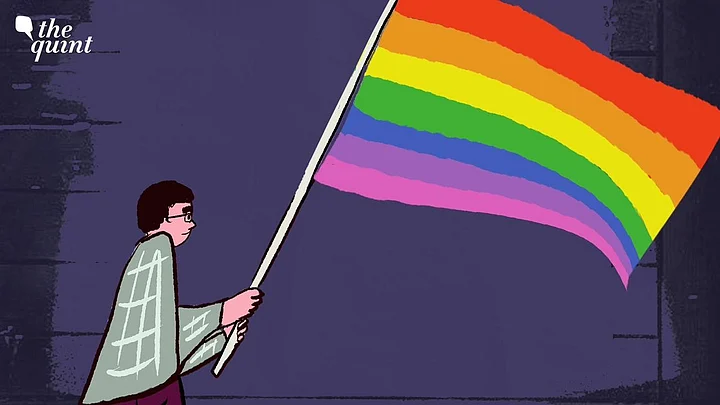A mysterious poster with religious messaging recently stirred up a row in Jamia Millia Islamia (JMI) for propagating the need to tackle 'sexual perversions like LGBT.'
But what started on the university campus has now translated to online hate and heavy trolling on social media platforms.
"These posters had been distributed and stuck on the walls around the campus, in student hotspots like canteens, and on the walls of different departments," said Nitin* (name changed), a student of journalism at the university and member of the Jamia Queer Collective (JQC).
JQC – a body founded in 2018 as a way to create a safe space on the campus for queer people – issued a statement and shared it on social media.
"The statement gained a lot of traction. People started calling us filthy, dirty, and how we are the perverts," Radhika Modi, a former Jamia student and co-founder of the JQC, told The Quint. "These are things queer people have been hearing for ages, so it was very hurtful. I was very scared, mostly for the queer Muslims on the campus, because we all know how situations can escalate."
Who Is Behind the Mysterious Posters?
According to the JQC, a "traditionalist religious organisation" by the name of 'Al-Haya Min Allah' had distributed pamphlets across the university campus, in a ploy to "spread extremely harmful misinformation about the LGBTQIA+ community masked as religious guidance."
They view homosexuality as a "sin" – and "something to be guarded against," the JQC added.
Al-Haya Min Allah is a religious organisation that finds its roots in Aligarh Muslim University – and now has its own presence on the Jamia campus. The organisation regularly holds discussions on campus and online sessions in an attempt to impart religious knowledge to college students.
'Queer Muslims Have Always Existed'
"Queer Muslims have always existed and their identity of being queer will never invalidate their identity as Muslims," the JQC said.
When the JQC shared its statement against the religious posters online, its hope was to get the administration to take notice. However, the online hate faced by students "terrified" them.
"Within a day, we were inundated with posts and reels doxing members of our organisation. Their numbers and photos were being leaked, even after we had archived everything on our social media. This is a cause for a lot of stress and worry because the queer community has always been in a vulnerable position."Nitin
Radhika worries about the impact of hate campaigns on students.
"They had put these posters on the doors of the boys' hostel as well, and when someone took them down, they would be back up on the doors the very next day. If no one is there to stop them from putting up such polarising posters, what's stopping them from then having spaces for discussions that stem from these homophobic agendas?" asked Radhika.
So far, no one from the Jamia administration has reached out to the JQC or condemned the posters.
"In a so-called democratic safe space, how can a faceless organisation tell us how to behave?" asked Radhika.
After the online trolling against the JQC, an alumni group of Jamia's AJK Mass Communication Research Centre issued a statement, condemning the "anti-LGBTQIA+ group's campaign."
They emphasised how such campaigns create a "highly unequal, uncomfortable, and hostile environment" on the campus. The alumni group also urged the JMI administration to take action against 'Al-Haya Min Allah' – and urged students of the university to stand in solidarity with Jamia's queer community.
The Issue Is Much Bigger
"We are not only opposing this organisation that has vilified the queer community, but we are also talking about the systemic issue within the Jamia community," said Nitin.
"If this was a communally charged poster, student organisations and the JMI administration would have taken notice of it and opposed it, without a doubt. So, why can't the queer community, another vulnerable minority in the university, feel safe?"
Sakhi, a student of the Department of Sociology at Jamia, alleged that the environment is "quite heteronormative and against the queer community."
"As an SFI (Students' Federation of India) member, I know that taking any kind of stand with the queer community is bound to harm any student organisation in Jamia but we cannot choose to stay silent. I have been in touch with the JQC, and we feel that it is important for the administration to take action. We want to push the administration towards making the campus a safer space for queer students," added Sakhi.
According to a professor and a member of the Jamia Teacher's Association (JTA), who agreed to speak on conditions of anonymity, the faculty of the university is in no position to raise complaints or stand up for any cause at the moment.
"The minute something out of the ordinary happens, we get a suspension notice," said the professor.
Dr Irfan Qureshi, a professor at JMI and former secretary of the JTA, however, negated the hate campaign. He deemed it as a ploy to get attention.
"I really don't know anything about such issues; where and how such groups operate. Such issues arise for seeking attention and footage, be this side or that," said Dr Qureshi.
Radhika, however, said that the JQC never wanted to make any noise or attract any unwanted attention.
"We know that the kind of solidarity we are hoping to get from the administration is never going to happen. We just want acceptance, and recognition of the fact that, yes, there are queer people in the university, just like there are queer people in every university. When we say that it is a great space to learn, let's also try and make it a safe space to learn," said Radhika.
(At The Quint, we question everything. Play an active role in shaping our journalism by becoming a member today.)
